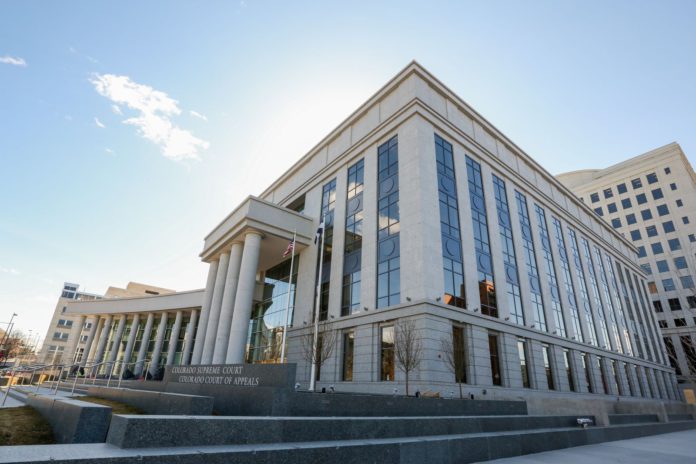

Denver law firm Davis Graham & Stubbs was party to a lawsuit before the Colorado Supreme Court earlier in January. The case, heard by the high court Jan. 9, questions whether Davis Graham & Stubbs committed fraud by keeping up appearances that it was representing a party in a land deal.
In actuality, DGS was representing another company that [hired the other company] to be an agent. With the lawyers arguing before the court seeming to disagree on facts of the case, the matter might be as simple as “seller’s remorse,” according to the attorney arguing on behalf of DGS.
BACKGROUND FACTS
In the underlying issue in Rocky Mountain Exploration v. Davis Graham & Stubbs, plaintiff Rocky Mountain Exploration sold land and mineral rights to Lario Oil and Gas Company. Lario, however, was not buying the land wholly on its own. The company kept a portion of the land itself and was also acting as an agent for an “undisclosed principal,” an unnamed buyer in a transaction, Tracker Resource Exploration.
According to Rocky Mountain, though, had it known of Tracker’s involvement, the sale wouldn’t have happened. The case came down to a key interaction, when the plaintiff alleges Lario referred to Davis Graham & Stubbs as its counsel in an email and DGS didn’t speak up to set the record straight. According to DGS, though, the law firm was still acting in the interests of its undisclosed principal and the omission was immaterial to the deal.
The Colorado Court of Appeals upheld a summary judgment decision for Davis Graham & Stubbs.
ROCKY MOUNTAIN’S ARGUMENT
Rocky Mountain is pursuing claims against DGS for fraud and breach of fiduciary duty. According to Dean Neuwirth, the attorney for Rocky Mountain, DGS’ actions alone were enough to be fraudulent under the precedent set by a 1911 case, Brown v. Lynn, in which a seller in a land transaction held himself out as the free and clear owner of the land when he was not.
Rocky Mountain argued that DGS committed a similar act of fraud by holding itself out to be Lario’s attorney, and the company claims that misrepresentation began from the start.
All Lario did through the transaction was to serve as Tracker’s “straw man” to purchase the land, Neuwirth said. Davis Graham & Stubbs knew Lario was lying and did nothing, he said and “under the law, that means they affirmed the lies.”
Rocky Mountain referred to emails reminding the parties involved in the purchase to keep the connection between Lario and Tracker a secret. According to Rocky Mountain, Davis Graham & Stubbs was aiding and abetting the fraudulent concealment between the two companies.
DGS’ ARGUMENT
Sean Connelly, a solo practitioner who argued on behalf of Davis Graham & Stubbs, said the purchaser parties were acting legally with Tracker as an undisclosed principal, Davis Graham & Stubbs provided ethical legal representation and that finding otherwise could have big implications for the legal system in general.
“There is a lot wrong with this lawsuit, including the idea that a client’s adversary can sue a client’s attorneys for conspiring with and aiding and abetting their own client,” Connelly said. “That’s what attorneys are supposed to do. … This threatens our entire adversary system. This turns the law of undisclosed principals on its head.”
According to Connelly, the seller should have had a “win-win” situation by selling the land for a price it believed was fair to a buyer that was happy to buy it. The fact that Rocky Mountain was later upset that Tracker was the majority buyer was simply “seller’s remorse” for not asking for a higher price.
And regarding Davis Graham & Stubbs’ alleged fraud, Connelly claimed it was immaterial because the instances where Lario referenced the law firm as its attorneys happened after the contracts were signed and the parties were committed to the deal.
“If you want that to be material, you have to write a contract saying there is no undisclosed principal,” Connelly said. He went on to explain that the email referenced by the plaintiff in which Lario referred to Davis Graham & Stubbs as its attorneys was an example of DGS helping Lario close the deal on behalf of its client, Tracker.
THE COURT’S QUESTIONS
The bench, made up of six justices with newly seated Justice Melissa Hart absent from the case, posed many questions to the arguing appellate lawyers.
Justice Richard Gabriel posed the question that seems to be the core issue to the case: why Rocky Mountain was suing Davis Graham & Stubbs for fraud for conduct and when conduct creates false representation. Gabriel asked why Rocky Mountain wasn’t suing for fraudulent concealment.
Rocky Mountain referred to the 1911 Brown v. Lynn case and said there was written misrepresentation through the email from Lario referencing the law firm as its attorneys and that the firm’s conduct alone in not setting things straight could be construed as misrepresentation.
Justice Nathan Coats also asked why the burden shouldn’t be on Rocky Mountain to insist on a disclosure of any undisclosed principal, something that drew in-depth arguments from both parties.
“The law says what kind of measures a reasonably prudent person should take to protect themselves from fraud,” Neuwirth said. “There is nothing in the language itself that imposes the requirement you’re suggesting.”
According to Connelly, though, the law regarding undisclosed principals creates two circumstances where an undisclosed principal amounts to fraud: when there is the false denial about existence of undisclosed principal, and when a party would not have dealt with the undisclosed principal had they known about them. “They flunked both those requirements,” Connelly said. Not upholding those exceptions “defeats and eviscerates the whole rule of undisclosed principals,” according to Connelly.
Neuwirth responded by saying, “It’s not about holding out for more money, it’s about not selling to Tracker.” He asked the court to reverse summary judgment from the district court and send the case back to trial.
— Tony Flesor

